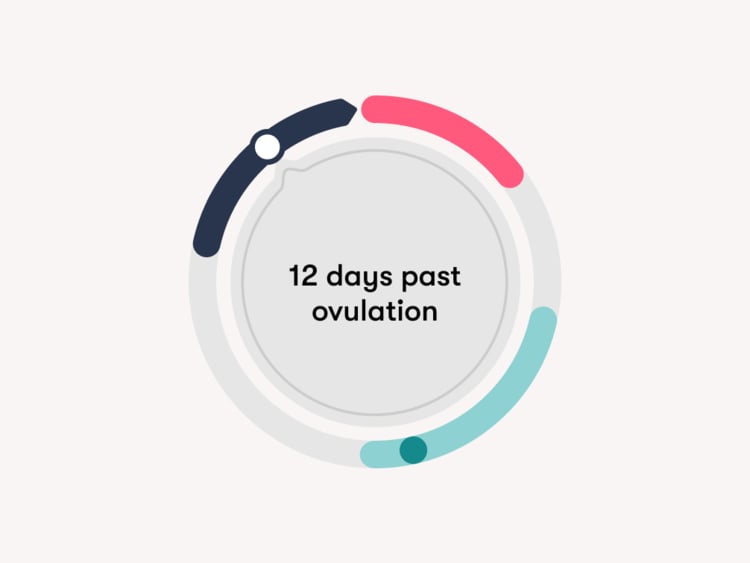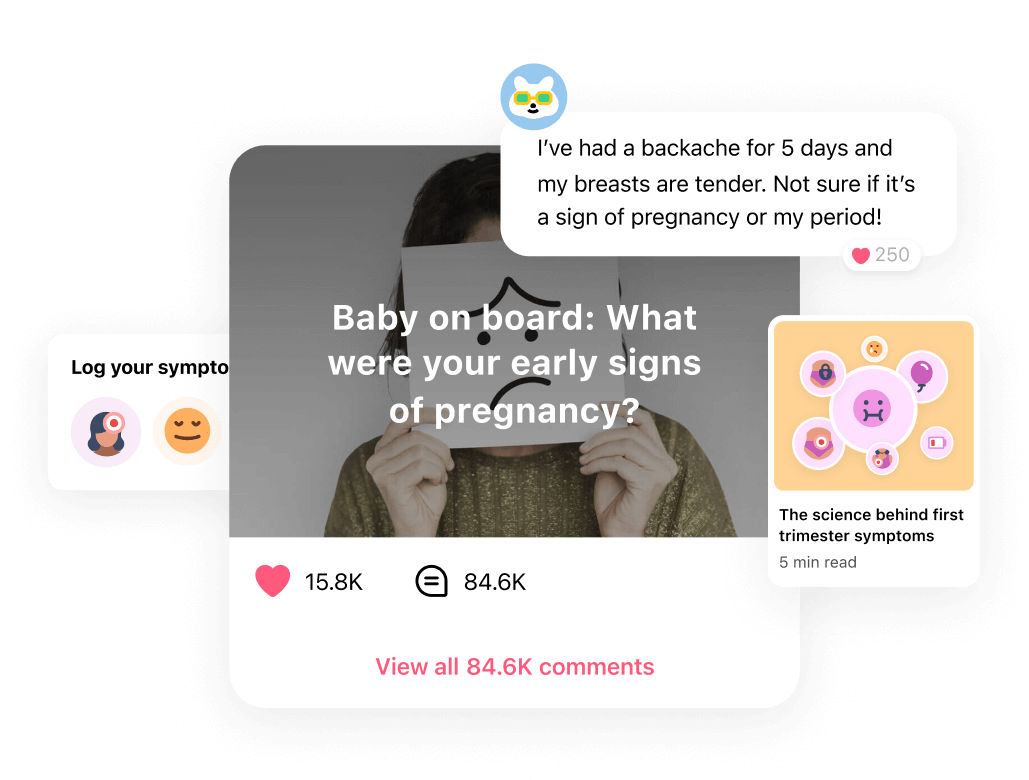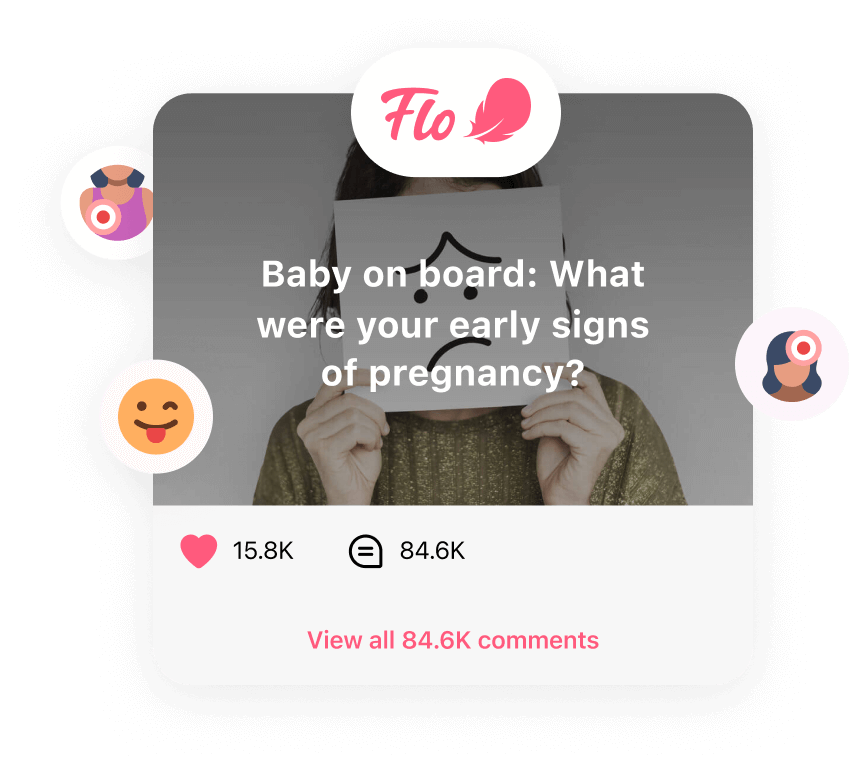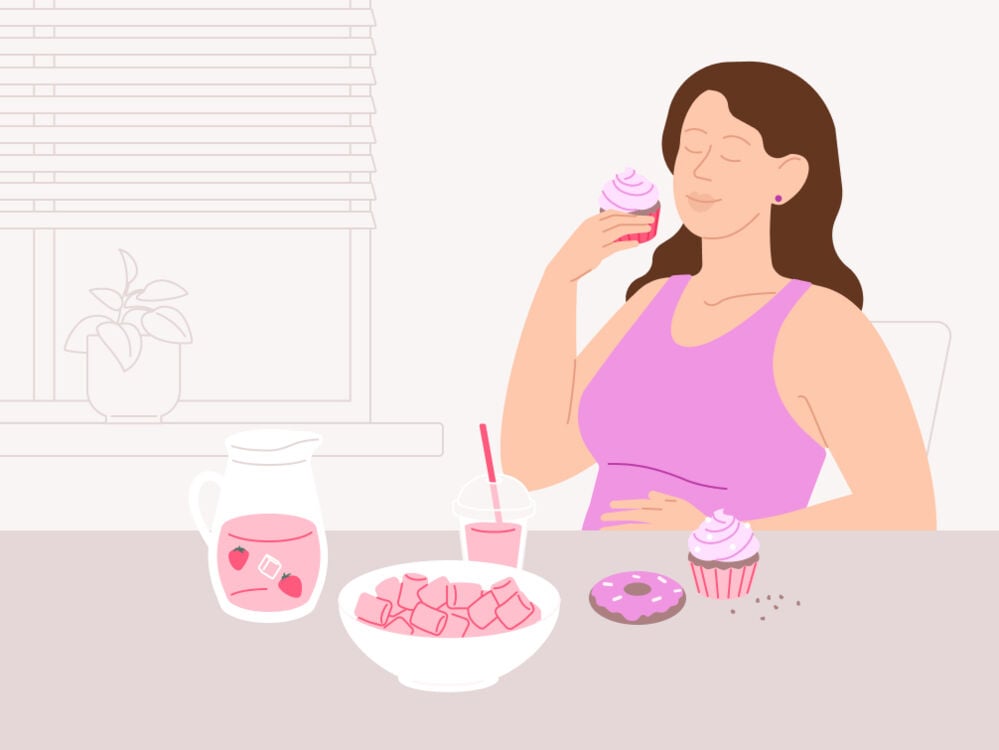It’s normal to be looking for signs that you’re pregnant, but is it too early to tell? Here’s the lowdown on 12 DPO, including whether you can take a test.
-
Tracking cycle
-
Getting pregnant
-
Pregnancy
-
Help Center
-
Flo for Partners
-
Anonymous Mode
-
Flo app reviews
-
Flo Premium New
-
Secret Chats New
-
Symptom Checker New
-
Your cycle
-
Health 360°
-
Getting pregnant
-
Pregnancy
-
Being a mom
-
LGBTQ+
-
Quizzes
-
Ovulation calculator
-
hCG calculator
-
Pregnancy test calculator
-
Menstrual cycle calculator
-
Period calculator
-
Implantation calculator
-
Pregnancy weeks to months calculator
-
Pregnancy due date calculator
-
IVF and FET due date calculator
-
Due date calculator by ultrasound
-
Medical Affairs
-
Science & Research
-
Pass It On Project New
-
Privacy Portal
-
Press Center
-
Flo Accuracy
-
Careers
-
Contact Us
12 DPO: Are there any pregnancy symptoms at 12 days past ovulation?


Every piece of content at Flo Health adheres to the highest editorial standards for language, style, and medical accuracy. To learn what we do to deliver the best health and lifestyle insights to you, check out our content review principles.
When you’re trying to conceive, timing can be everything. Knowing when you might have ovulated, when your fertile window is, and when you can take a pregnancy test can help you feel more in control. But all of this also adds to the mental load, especially if you’re on the lookout for signs that could indicate that you’re pregnant, too.
So, what do you really need to know at 12 DPO? We asked Dr. Renita White, obstetrician and gynecologist, Georgia Obstetrics and Gynecology, Georgia, US, for the lowdown, including what might be happening to your body at this point in your cycle and the best time to take a pregnancy test to get an accurate result.
Key takeaways
- Implantation (when your fertilized egg attaches to the lining of your uterus) marks the official start of pregnancy. Generally, this happens between six and 10 DPO. This means at 12 DPO, you may be officially pregnant. However, it’s still a little early to notice some of the signs of pregnancy.
- While you might be pregnant at this point, it’s still recommended that you wait until 14 DPO or the first day of your missed period to take a pregnancy test. This is because home tests work by picking up the pregnancy hormone hCG in your pee. While your hCG levels start low, they rise rapidly at the beginning of pregnancy.
- If you test too soon, you risk getting a false negative, as your hCG levels may not be high enough yet to register on a home test.

 Over
7.8M
ratings averaging
4.8/5
*
Over
7.8M
ratings averaging
4.8/5
*
Understand your body’s signals with the Flo app
- Chat with others who are trying to get pregnant.
- Get trusted information on signs of pregnancy from 100+ medical experts.
- Log your symptoms and learn what they could be trying to tell you.
 Over
7.8M
ratings averaging
4.8/5
*
Over
7.8M
ratings averaging
4.8/5
*

Trying to conceive?
The Flo app can help you through the two-week wait.

 Over
7.8M
ratings averaging
4.8/5
*
Over
7.8M
ratings averaging
4.8/5
*
Understand your body’s signals with the Flo app
- Chat with others who are trying to get pregnant.
- Get trusted information on signs of pregnancy from 100+ medical experts.
- Log your symptoms and learn what they could be trying to tell you.
12 DPO: What to expect?
Simply put, 12 DPO means that 12 days ago, one of your ovaries released an egg to be potentially fertilized by a sperm. You might be curious as to why this is a pretty pivotal time if you’re trying to conceive. To understand this, it can help to break down your cycle into two stages:
- The follicular phase: The first part of your cycle is known as your follicular phase. The first day of a new period marks the first day of a new cycle. That’s easy to remember, right? The length of your period is pretty personal to you, but what happens in this phase is the same for everyone. Your estrogen levels rise, and the lining of your uterus thickens to prepare your body for ovulation. Similarly, your ovaries prepare an egg to be released during ovulation.
- The luteal phase: If you have a 28-day cycle, then around day 14, one of your ovaries will release an egg. This is ovulation. From ovulation until the end of your cycle, you are in your luteal phase. This means that when you’re 12 DPO, you’re in this phase of your cycle. Your progesterone levels will rise to support a potential pregnancy, and — if you conceive — then your fertilized egg may implant into the lining of your uterus. The luteal phase is more consistent, approximately 14 days, so any variance in cycle length is typically from the first half of the cycle. Its name is related to the corpus luteum cyst that forms on the ovary after ovulation and has the job of secreting progesterone to support an early potential pregnancy.
If implantation did happen at around six to 10 DPO, then you might officially be pregnant at 12 DPO. Once this happens, your placenta starts to develop. This is a whole new organ that your body grows to support your pregnancy. It produces human chorionic gonadotropin (hCG), (4) the pregnancy hormone that at-home urinary tests detect in your pee. It later will also take over progesterone production to support a growing pregnancy, usually after eight weeks or so.
Dr. White explains that your hCG plays an important role in “maintaining the pregnancy, so your body doesn’t trigger a menstrual cycle, but it also can cause bothersome symptoms typical for pregnancy.” These can include things like tiredness or feeling nauseous.
The tricky thing is that these symptoms are also common premenstrual symptoms. You might have heard some of the symptoms you experience before your period be described as premenstrual syndrome (PMS). And, since a normal menstrual cycle is considered to be 21 to 35 days long, 12 DPO is pretty far along the second part of it (your luteal phase). This means you might expect your period to start in the next week or two. You’ll likely be able to spot the signs that your period is coming, but if you are pregnant, it can be hard to differentiate between premenstrual symptoms and early pregnancy signs.
Can I take a pregnancy test at 12 DPO, or is it too early?
Experts recommend that you wait at least until the first day of your missed period before you take a pregnancy test. This works out to be around 14 DPO, depending on the length of your cycle. Since there’s only a two-day difference between 12 and 14 DPO, it can feel tempting to reach for a test early. However, giving your body enough time to produce enough hCG to be detected on an at-home test is crucial.
While they start low, your hCG levels rise rapidly after implantation. However, if you test before the first day of your missed period, you run a higher risk of getting a false negative. This can be disheartening, so try to wait. HCG levels have to reach a certain level to even be detected in your urine.
This might sound easier said than done. Waiting to take a test when you think you might be pregnant can feel nerve-racking. If you feel you can, fill your days with activities that will take your mind off taking a test. Reach out to friends or family members that you can be yourself with. Get lost in a new series or book, or throw yourself into a new project at work. If you already have some self-care practices up your sleeve that always make you feel good, then lean on them.
Pregnancy symptoms at 12 DPO
While 12 DPO might still be a little bit early to do a pregnancy test, you might feel slightly different — that’s all due to shifting hormones caused either by your cycle or a very early pregnancy. These are the most common symptoms women report at this time:
Food cravings
Do you have food cravings in the run-up to your period starting? This could be due to changes in your hormone levels during the luteal phase of your cycle. Your estrogen levels, in particular, have been found to inhibit appetite. When your estrogen levels are low, you might feel hungrier.
Unusual food cravings or aversions are also common during the 1st trimester of pregnancy. If you suddenly find yourself repulsed by a snack you usually enjoy, it could be a sign you’re expecting.

Cramping and backache
You might be experiencing cramping and backache at 12 DPO, which feels a little bit like your period is on its way. This might be something you experience every month but not be totally sure why. Here’s a quick biology lesson. Cramping can be caused by hormone-like substances called prostaglandins. They’re released by the lining of your uterus and can cause it to contract, leading you to feel cramps. You might find that heat helps to soothe your cramps, so don’t hesitate to make a hot water bottle.
Cramps have also been linked to implantation. Are you curious about how? Some people say that when their fertilized egg attaches to the lining of their uterus, they feel a dull ache. There’s no scientific evidence to suggest that cramping is a sign of implantation, but some people say they feel it.
Fatigue
If you’re struggling to keep your eyes open at 12 DPO, it could be due to your hormones. Rising progesterone levels during your luteal phase may mean you feel more tired than usual. For this reason, fatigue is also pretty common in early pregnancy.
Breast changes
Abdominal cramps aren’t the only ache you might feel in the weeks before your period. Your boobs might feel different too. This is sometimes known as cyclical breast pain and describes how your boobs may look different or feel tender as your hormones fluctuate.
Similarly, swollen or tender breasts are also a sign of pregnancy. In preparation for milk production, the ducts in your breasts can enlarge, which can leave them feeling more sensitive than usual.
Headaches
Headaches can be a serious pain, and if you notice that you experience more of them in the week before your period, then you can point the blame at fluctuations in your hormone levels. For similar reasons, migraines and tension headaches have been linked to early pregnancy. This can be debilitating, so don’t hesitate to reach out to your health care provider for help and support if you need it.
Nausea
Period nausea is pretty common during your luteal phase. Nausea doesn’t necessarily mean vomiting and can be really uncomfortable. If you find yourself reaching for the sick bucket in the week before your period, give yourself the space to relax and recuperate.
Nausea is also sometimes described as morning or pregnancy sickness when you’re expecting. It could be an early sign that you’re having a baby. However, generally speaking, many people don’t start noticing this for a few weeks, and some people never experience pregnancy nausea.
Mood swings
Have you found yourself feeling tearful as you count down the days to your period? This could be a sign of PMS. However, mood changes are also fairly common in early pregnancy as your hormone levels fluctuate. Confusing, right?
Take a quiz
Find out what you can do with our Health Assistant
12 DPO and no symptoms
Trying to differentiate between typical premenstrual symptoms and what might be a sign of early pregnancy can be tough. Everyone experiences pregnancy slightly differently, and the only way to know if you’re pregnant is by waiting until the first day of your missed period and taking a test.
You might not feel any different at all at 12 DPO, and this is also normal. This doesn’t necessarily mean you aren’t pregnant. Some people don’t have any pregnancy symptoms for a few weeks, so try not to worry.
More FAQs
Is it normal to test negative at 12 DPO?
It’s still a little bit early to tell if you’re pregnant. Many experts recommend waiting at least until the first day of your missed period before taking a test to give your body time to produce high enough levels of the pregnancy hormone hCG (this is what home tests pick up in your pee). If you have a 28-day cycle, then this is around 14 DPO, but this can slightly differ depending on your cycle length. If you get a negative test at 12 DPO, try not to be disheartened. This may just mean that your hCG levels are too low to be detected right now.
Is 12 DPO too late for implantation?
Your cycle length is pretty unique to you. Typical menstrual cycles can last between 21 and 35 days, and the day you ovulate and when implantation might have happened can differ depending on this. Generally speaking, implantation typically happens between six and 10 DPO, so 12 DPO would be considered to be late.
When does hCG show up in urine?
HCG is the hormone that your placenta produces and pregnancy tests look for in your pee. Experts recommend that you wait at least until the first day of your missed period (or 14 DPO) before taking a test to allow time for your hCG levels to rise high enough to be detected.


Hey, I'm Anique
I started using Flo app to track my period and ovulation because we wanted to have a baby.


The Flo app helped me learn about my body and spot ovulation signs during our conception journey.


I vividly
remember the day
that we switched
Flo into
Pregnancy Mode — it was
such a special
moment.
Real stories, real results
Learn how the Flo app became an amazing cheerleader for us on our conception journey.
References
“Week 4.” NHS, www.nhs.uk/start-for-life/pregnancy/week-by-week-guide-to-pregnancy/1st-trimester/week-4/. Accessed 5 Dec. 2023.
Aikaterini, Giannakopoulou. “PMS (Premenstrual Syndrome).” International Journal of Complementary and Alternative Medicine, vol. 6, no. 1, 17 Mar. 2017, doi.org/10.15406/ijcam.2017.06.00175.
“Am I Pregnant?” Cleveland Clinic, my.clevelandclinic.org/health/articles/9709-pregnancy-am-i-pregnant. Accessed 16 Nov. 2023.
Betz, Danielle, and Kathleen Fane. “Human Chorionic Gonadotropin.” StatPearls, StatPearls Publishing, 2023, www.ncbi.nlm.nih.gov/books/NBK532950/.
“Conception.” Cleveland Clinic, my.clevelandclinic.org/health/articles/11585-conception. Accessed 5 Dec. 2023.
“Doing a Pregnancy Test.” NHS, www.nhs.uk/pregnancy/trying-for-a-baby/doing-a-pregnancy-test/. Accessed 5 Dec. 2023.
“Emotional Changes in Pregnancy.” Tommy’s, www.tommys.org/pregnancy-information/im-pregnant/mental-wellbeing/emotional-changes-pregnancy. Accessed 5 Dec. 2023.
“First Trimester Fatigue.” Johns Hopkins Medicine, www.hopkinsmedicine.org/health/conditions-and-diseases/first-trimester-fatigue. Accessed 5 Dec. 2023.
“Follicular Phase.” Cleveland Clinic, my.clevelandclinic.org/health/body/23953-follicular-phase. Accessed 5 Dec. 2023.
Gudipally, Pratyusha R., and Gyanendra K. Sharma. “Premenstrual Syndrome.” StatPearls, StatPearls Publishing, 2023, www.ncbi.nlm.nih.gov/books/NBK560698/.
“Headaches in Pregnancy.” NHS, www.nhs.uk/pregnancy/related-conditions/common-symptoms/headaches/. Accessed 5 Dec. 2023.
Hirschberg, Angelica Lindén. “Sex Hormones, Appetite and Eating Behaviour in Women.” Maturitas, vol. 71, no. 3, Mar. 2012, pp. 248–56, doi:10.1016/j.maturitas.2011.12.016.
Kim, Su-Mi, and Jong-Soo Kim. “A Review of Mechanisms of Implantation.” Development and Reproduction, vol. 21, no. 4, Dec. 2017, pp. 351–59, doi:10.12717/DR.2017.21.4.351.
“Luteal Phase.” Cleveland Clinic, my.clevelandclinic.org/health/articles/24417-luteal-phase. Accessed 5 Dec. 2023.
MacGregor, E. A. “Hormone-Related Headaches.” Cephalalgia, vol. 18, no. 4, May 1998, pp. 228–29, doi:10.1046/j.1468-2982.1998.1804227-3.x.
“Menstrual Cramps.” Mayo Clinic, 30 Apr. 2022, www.mayoclinic.org/diseases-conditions/menstrual-cramps/symptoms-causes/syc-20374938.
“Menstrual Cycle: What’s Normal, What’s Not.” Mayo Clinic, 22 Apr. 2023, www.mayoclinic.org/healthy-lifestyle/womens-health/in-depth/menstrual-cycle/art-20047186.
Negro, A., et al. “Headache and Pregnancy: A Systematic Review.” The Journal of Headache and Pain, vol. 18, no. 1, Oct. 2017, p. 106, doi:10.1186/s10194-017-0816-0.
“Normal Breast Development and Changes.” Johns Hopkins Medicine, www.hopkinsmedicine.org/health/conditions-and-diseases/normal-breast-development-and-changes. Accessed 5 Dec. 2023.
“Placenta.” Cleveland Clinic, my.clevelandclinic.org/health/body/22337-placenta. Accessed 5 Dec. 2023.
“Pregnancy Cravings and Food Aversions.” Tommy’s, www.tommys.org/pregnancy-information/being-pregnant/nutrition-pregnancy/cravings-food-and-drinks-pregnancy. Accessed 5 Dec. 2023.
“Premenstrual Syndrome (PMS).” NHS Inform, 28 Feb. 2023, www.nhsinform.scot/healthy-living/womens-health/girls-and-young-women-puberty-to-around-25/periods-and-menstrual-health/premenstrual-syndrome-pms/.
“Progesterone.” Cleveland Clinic, my.clevelandclinic.org/health/body/24562-progesterone. Accessed 21 Nov. 2023.
Schoep, Mark E., et al. “The Impact of Menstrual Symptoms on Everyday Life: A Survey among 42,879 Women.” American Journal of Obstetrics and Gynecology, vol. 220, no. 6, June 2019, pp. 569.e1–e7, doi:10.1016/j.ajog.2019.02.048.
Su, Ren-Wei, and Asgerally T. Fazleabas. “Implantation and Establishment of Pregnancy in Human and Nonhuman Primates.” Advances in Anatomy, Embryology, and Cell Biology, vol. 216, 2015, pp. 189–213, doi:10.1007/978-3-319-15856-3_10.
Thiyagarajan, Dhanalakshmi K., et al. “Physiology, Menstrual Cycle.” StatPearls, StatPearls Publishing, 2022, www.ncbi.nlm.nih.gov/books/NBK500020/.
“Vomiting and Morning Sickness.” NHS, www.nhs.uk/pregnancy/related-conditions/common-symptoms/vomiting-and-morning-sickness/. Accessed 5 Dec. 2023.
“You and Your Pregnancy at 1 to 3 Weeks.” NHS, www.nhs.uk/pregnancy/week-by-week/1-to-12/1-2-3-weeks/. Accessed 5 Dec. 2023.
History of updates
Current version (15 December 2023)
Published (02 May 2019)
In this article

Get your personal guide to fertility
-
Learn how to read your body's ovulation signals
-
Find daily conception tips from our experts
-
Chat with others who are trying to get pregnant




